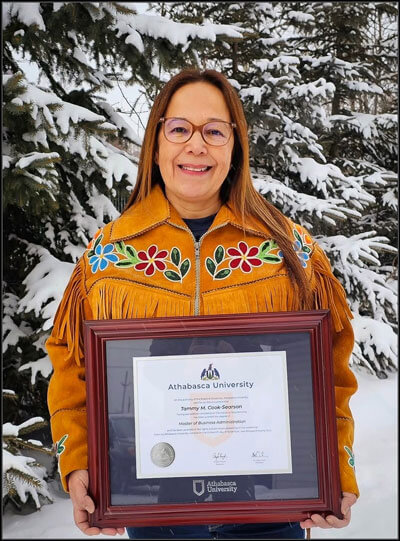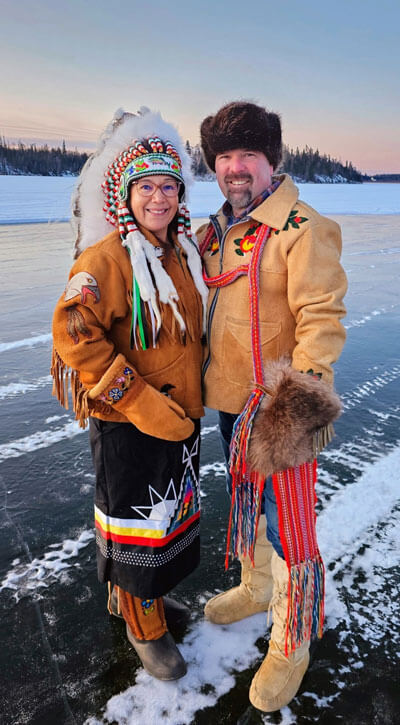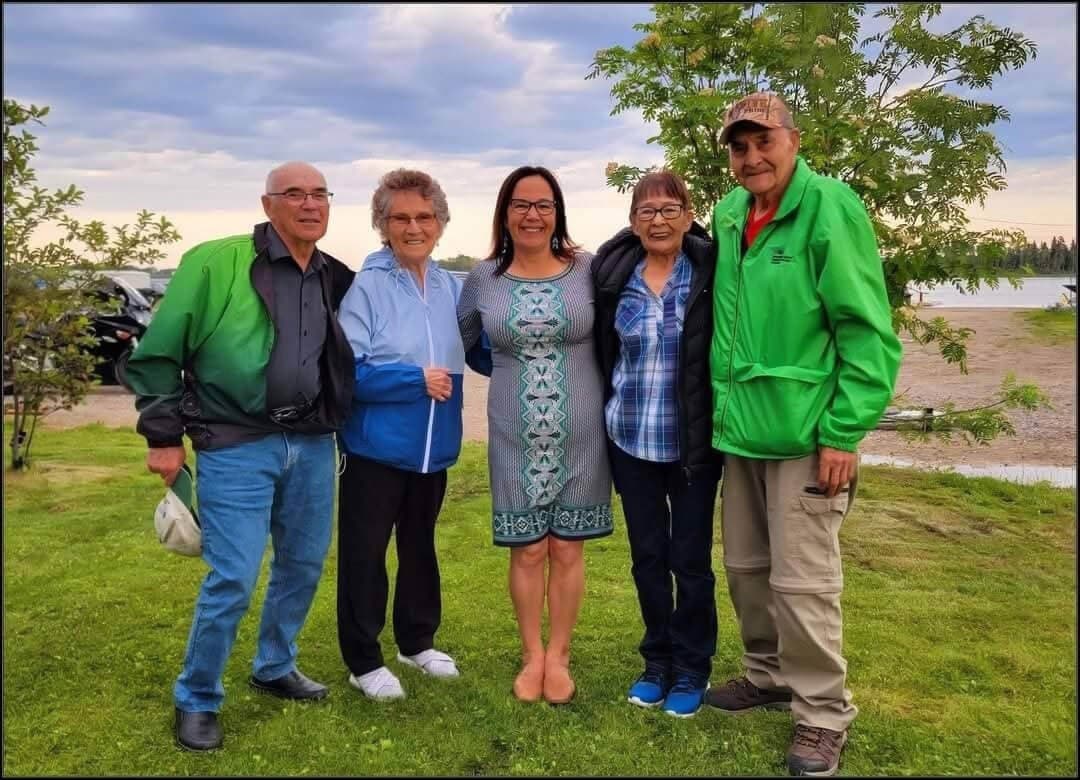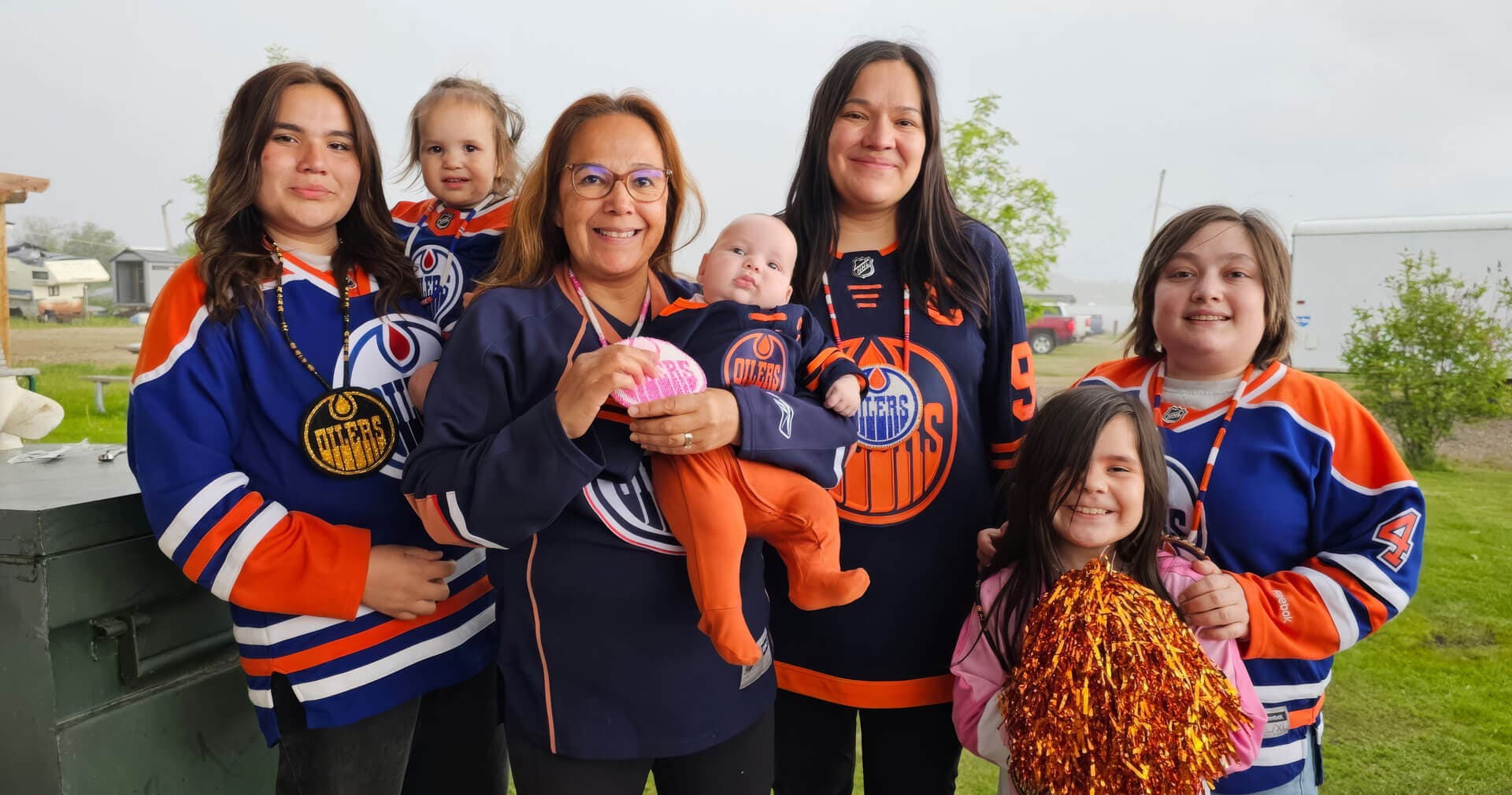Class of 2025 MBA grad helped oversee the evacuation of 8,500 people as wildfires raged in northern Saskatchewan
For 10 straight days in June, Chief Tammy Cook-Searson (Master of Business Administration ’25) of Lac La Ronge Indian Band was lucky if she got two hours of sleep at night.
Several massive wildfires in northern Saskatchewan had forced the evacuation of the community on June 2—an order that was in effect until June 12. The evacuation saw about 8,500 people in the region uprooted from their homes to stay in emergency shelters in Prince Albert and other communities.
 Chief Tammy Cook-Searson with her MBA.
Chief Tammy Cook-Searson with her MBA. Cook-Searson stayed behind at her home in La Ronge to lead the community she has served for more than three decades—including the past 20 years as Chief. When she wasn’t online with her leadership team in emergency operations centre meetings, she was personally updating communications on the Band’s website and keeping members informed on social media.
Sleep? It was an afterthought.
“I just kept going because it’s one of those situations where you don’t stop when you’re tired. You stop when it’s done, right? It’s like a marathon,” says Cook-Searson, an avid runner.
The emergency evacuation has lifted, however, life is far from normal as the region and its people deal with the loss of a dozen homes, two businesses, and several trapline cabins in the area. Additionally, for a community that relies heavily on traditional foods and game, a major concern was the spoilage that occurred during a week-long power outage.
“Devastating damage,” she says. “We'll be here to support our community members as best as we can.”
Sleep wasn’t the only thing that Cook-Searson missed during the crisis. Unable to leave home, she missed Athabasca University’s convocation ceremonies in Athabasca, Alta. on June 6, where she was to receive her MBA after four years of study.
“I was sad to miss the convocation ceremony. It was something I was really, really looking forward to.”
Though she did receive a congratulatory call from AU President Dr. Alex Clark the day of the ceremony, we also wanted to help celebrate “Chief Tammy,” as she’s known in the La Ronge community, and share a few details of her journey with the AU community.
View this post on Instagram
The Piskew fire near Besnard Lake, Sask. in late May.
'It was a lot of pressure'
Everyone at AU is glad that you and everyone in your community are safe. What have the last several weeks been like?
The fires were very hot, fast and furious, and they were taking everything that was in their path. We had firefighters, helicopters, our own First Nations crews, and crews from all over Saskatchewan coming in to help us. And not only was it impacting the communities, it was also impacting trapline cabins, where people spend a lot of time. And you know, it's a place where we still spend a lot of time on the land as trappers, fishermen, hunters, gatherers. So it's a big part of our life, having our Woodland Cree Culture and Traditions.
It was really important for me to be here and to be able to help the community, and also the community members who were displaced from their homes. Just being a contact and troubleshooting any issues that came up, working together to try to find resolution. Human life is always our top priority.
Were you in an emergency operations centre during the evacuation?
A lot of emergency operations centre meetings with our senior team we did online through Teams. Everybody can just join in from wherever they are. [Most were in Prince Albert].
I’m a big part of that because I’m not only the Chief of La Ronge, I’m also Chief of five other communities (La Ronge Indian Band, Stanley Mission, Sucker River, Grandmother’s Bay, Hall Lake, and Little Red). It was a lot of pressure.
You stayed behind throughout the evacuation, is that correct?
Yes, I stayed home and close to the community. I was the communication person sharing whatever information about the fires I could from the Saskatchewan Public Safety Agency, or SaskTel, publishing that information on the Band website and on social media. The information changes really fast, but you have to get the word out and that’s what we did. We just kept at it.
Was your own home safe?
It survived, but the fire was right behind the house, so it was coming at us. Our local firefighters, our public works and housing department had water tanks going, trying to save structures. We had volunteer fire departments from all over Saskatchewan come and help us, too. And we have firefighters from First Nations, communities, firefighters from B.C. and the U.S., so firefighters from all over.
Celebrating 20 years of leadership
Moving away from the wildfires, in March you celebrated 20 years as Chief. What was that like?
It doesn't even seem that long—time goes so fast! And before that, I was actually on Band Council for eight years. So I've been with the Band and Chief and on Council for 28 years now. And then, before that, I worked for the Band as a social worker. That’s 31 years.
What do you love about the work?
My late mom [Miriam Cook] was always that person who helped the community. I always admired her leadership and her strength. I remember people always saying, “Boy, your mom always helps out. It doesn't matter who it is.” I think I want to be able to help out and be the servant of the community members.
I want to be able to help out and be the servant of the community members.
Chief Tammy Cook-Searson
You’re joining AU’s Class of 2025 with an MBA. Why did you decide to go back to school?
My friend Marina Facci and I met during the 2019 federal election when I ran for the Liberal Party. We became close friends and started running together. She has a PhD—she’s a pharmacist—and two master’s degrees. She said, “You should go back to school.” I said I don’t think I can, and I don’t know if I can do it. She said, “Yes, you can.” So she talked me into school.
Why did you choose AU?
I didn’t have an undergraduate degree, but Athabasca University accepted me. I was really excited about that. I wasn’t sure if I could do it, but somehow I managed. I would highly recommend the AU way to get your schooling done. It's a flexible way to be able to get your formal education. It's not an easy program, but anything that's hard to get is usually also worth it.
 What was it like learning online for an MBA, raising a family, and running for Chief?
What was it like learning online for an MBA, raising a family, and running for Chief?
I spent a lot of time studying—a lot of late nights, lots of weekends, just getting my work done that I needed to get done. I don't even know how I did it, but I'm glad that I did, and made the sacrifices. One time, I had tickets to the Grey Cup that I had to forfeit because I had an assignment that was due! I also learned how to ignore my messy house.
How did your MBA program help you professionally?
I used a lot of stuff to apply to my work, including when reviewing the Band's strategic plan. Before, I would probably only go to the strategic planning session and maybe glance at the plan here and there. Because of the classes I took at AU, I studied it and was looking at it in different ways, like how a strategy is kind of like a compass, you know?
You have these plans in place so that you’re prepared when things happen. And anything can happen: storms can come up, fires can come up. I applied my learning to a lot of the stuff with the Band. I feel like I've grown a lot.
As the mother of three grown children, what did it mean for your kids to see how much work you put into your education?
I think it meant a lot to them because they saw me on my computer all the time. I sacrificed a lot taking my classes. My kids are really driven, too, which is good. I guess they learned that from somewhere!
You lost both your parents [Charlie and Miriam Cook] during your degree. How proud would they be about your accomplishment?
Both my parents ended up getting cancer and have passed now, but they were really big on keeping at it, going to school and finishing. They always wanted us to succeed, like my siblings and I and the grandkids.
I think they would have been there at convocation with me, because we celebrated my Graduate Diploma in Management. That was during COVID, but we had a supper and a barbecue at my house.
Given everything you’ve been through, you’ve earned some time off! What’s next for you?
For now, what I really want to do is just clean up my house and cut my grass and just stay close to home. And we're helping rebuild. We'll be here to support our community members as best as we can.


Convocation 2025—a celebration like no other!
Read more stories about AU students and grads as part of our Convocation 2025 coverage.